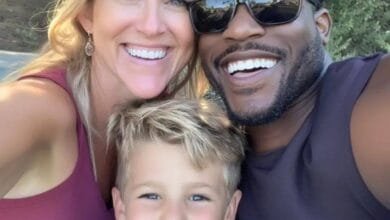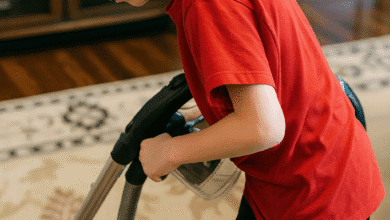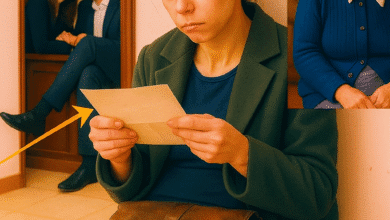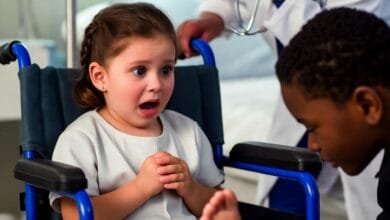“Auntie, could you please take care of my little brother? He is only five months old, terribly skinny from hunger, and desperately needs to be fed.”

Sitting on a bench outside the store, I was scrolling through my phone absentmindedly, barely noticing the hurried movement around me. People passed by quickly—some talking on the phone, others immersed in their own tasks. I might have continued indifferent if I hadn’t heard the voice of a child—thin, tired, but with surprising seriousness.
“Auntie, do you want a baby? Please take my little brother. He’s only five months old and very hungry…”
I looked up and saw a girl about six or seven years old, skinny, wearing a coat much too big for her, with her hair tied in a messy ponytail. Next to her, an old baby stroller from which came the soft sighs of an infant.
“Where is your mother?” I asked gently.
“She is tired… She’s been sleeping for a long time. I’m the one who feeds my brother. We only have bread and water left…”
“And where do you live?”
She pointed to an old five-story building.
“There. We called dad yesterday, but he said we have to manage on our own… He’s not coming…”
Something inside me tightened, like an invisible spring. I wanted to scream, cry, but the girl remained surprisingly strong. Because of her little brother, she had found the strength not to give up.
We went together to the apartment. I carried the baby in my arms while she walked beside me, looking up at me anxiously, as if afraid I might disappear too, just like all the other adults in her life.
The apartment was dark, damp, and cold. Toys scattered in a corner and, on the table, a note written:
“Forgive me, children. I can’t take it anymore. I hope good people find you.”
We called an ambulance immediately, and soon social workers arrived. But I couldn’t just leave.
Six months later, Liza and Artyom were officially my adopted children.
Now, our home smells of fresh cakes and echoes with children’s laughter—a place where no one needs to beg anymore: “Please take my little brother, he’s hungry.”
Almost a year has passed. Artyom smiles and claps whenever I arrive. Sometimes he wakes up crying in the middle of the night, and I hold him close until he calms down.
Liza looks older than she really is but is happy. She has her own room, a favorite stuffed bunny, and a new passion for pancakes—before she burned every one, now she proudly says:
“Mom, try these—they’re banana pancakes, just like yours!”
Her first “Mom” came out during a lunch of macaroni and cheese:
“Mom, pass the ketchup…”
She blushed:
“Sorry… I know you’re not really my mom…”
I hugged her tightly:
“Real, because I love you. Really.”
Since then, she calls me that because she wants to.
We visited their mother’s grave. I don’t judge her. She broke. Maybe, wherever she is, she’s glad I left the store that day and listened to Liza.
At that moment, Liza wasn’t just asking for her brother. She was looking for hope. And I answered:
“You both matter. Both of you.”
Not long ago, Liza lost her first tooth. She showed it shining in the palm of her hand.
“Mom, that means I’m grown up now, right?”
I laughed with tears in my eyes. Because finally, she can just be a child—wearing bear pajamas, leaving a note under her pillow:
“Dear Tooth Fairy, the tooth is gone, but you can still leave a coin—it’s okay.”
Artyom started walking. His little steps are music to me. Every time he looks at me as if to ask “Are you still here?” I answer:
“Always.”
We celebrated his first birthday with balloons, candles, and cake. Liza made cookies and wrote on a card:
“Happy birthday, Artyom. Now we all have a family.”
That night, she fell asleep on my shoulder—calm, unafraid, simply a child. My daughter.
In spring, we planted flowers together. Liza brought a letter.
“Can I bury this? It’s for mommy—the first one.”
I nodded and she read aloud:
“Mommy, I remember you. Sometimes I miss you. I’m not angry. We’re okay now. We have a mom who loves us. I’m almost grown up. Everything will be alright. We haven’t forgotten you—we’re just letting you go. With love, your Liza.”
She buried the letter and smoothed the soil.
“Thank you for giving us life. Now let us go. We’re safe.”
Sometimes, to change someone’s fate, all you have to do is listen—and stay.
Today, when we walk together, people smile. They see a normal family—and they’re right. This is common happiness: quiet, real, saving.
Two years later, Liza is in third grade. Artyom babbles his first words, singing “mommy.” And I am always here. And I will never leave.
AWARENESS ABOUT PERSONAL LOANS
Personal loans are an option sought by millions of Brazilians to overcome financial emergencies, fulfill dreams, or pay off other debts. However, it requires great caution because it may provide momentary relief but cause prolonged problems if poorly planned.
Borrowing money demands responsibility. First and foremost, it is essential to evaluate the reason for the loan. Is it for something essential, or could it have been avoided with financial organization? Many take loans to pay credit card debts, travel, or buy unnecessary items. This practice can create a cycle of dependency, especially if the loan is taken without planning.
Another important point is to analyze the conditions offered by the financial institution: interest rate, repayment term, installment amount, and their impact on the monthly budget. Even if the installment seems “affordable,” one must remember that unforeseen events happen—and a fixed commitment for months or years can strain the budget.
Today, with the ease of contracting credit even through mobile apps, many end up assuming commitments without reading contracts, comparing rates, or understanding the consequences of non-payment, such as high interest, credit score damage, and loss of market credit.
The best way to deal with loans is to use them objectively and with planning. Seek financial guidance before making a decision. In some cases, it is better to renegotiate existing debts or cut expenses than to take on new commitments.
Remember: loans should be a support tool for specific moments, not a constant resource. Discipline and understanding the impact of credit on personal life are essential to maintain financial health.





